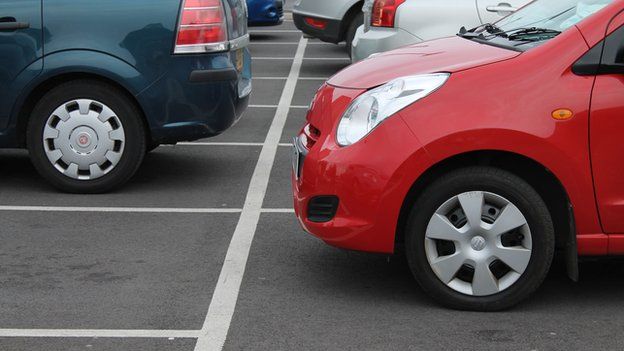RAC: Millions in private parking penalties 'charged illegally'
- Published
- comments

Millions of pounds of parking penalties could have been charged illegally, according to the RAC Foundation.
Penalties for overstays in car parks on private land in England and Wales could in some cases be unenforceable in court, the charity said.
It said the penalties were much more expensive than compensation for a genuine loss incurred by landowners.
But the Independent Parking Committee said penalties are the only protection landowners have against losses.
The foundation also called for the government to ensure that extra parking charges were "reasonable and enforceable" and wants to see its argument tested in court.
Possible refunds
Its report was compiled by barrister John de Waal QC, who also said parking companies were levying charges on drivers which were disproportionate to the losses suffered by landowners as a result of motorists' actions.
The Protection of Freedoms Act 2012 banned clamping, towing, blocking-in or immobilising a vehicle without lawful authority on private land, in a bid to end abuses by rogue clamping firms.
However, the foundation said that private car parks were now using overstay penalty charges as an alternative, with a system of ticketing which was "barely regulated".
Drivers who stay longer than the time they have paid for may receive tickets demanding payments of up to £100, and significantly more in some cases, it said.
It cited the case of a woman from High Wycombe who, in 2014, had been penalty charged £100 for overstaying in a car park which cost 20p per hour.
The report also said European legislation, which requires contracts to be fair, meant so-called "early payment discounts" of penalty charges could also be unlawful because they constitute a "price escalation clause".
It said when parking signs were not clear or prominently displayed, the charge could also be challenged on the grounds of unfairness.
'Barely regulated'
Foundation director Professor Stephen Glaister estimated overcharging in private parking penalties may have reached £100m in 2013, and said millions of drivers could be due a refund.
"We would like to see this legal argument tested in a higher court so that a binding precedent is set," he said.
He also said a case coming to the Court of Appeal next week, regarding a motorist who is contesting an £85 penalty charge, could establish a precedent in law if the motorist wins, meaning others could have a case to get money repaid.
Case study
Louise Turner, 28, of west London, was given a parking ticket in December in Uxbridge.
"I wasn't even parked. I got lost and drove on the land to turn around. I was on the land 186 seconds, but still received a £100 fine."
She paid "under duress" because she was threatened with bailiffs by the parking company, but says that if the law deems such charges illegal then she would appeal against hers "immediately".
"I know many people in the exact same situation who would recover their costs tomorrow, if it became possible," she said.
"It's imperative that this is dealt with. These companies are bullying people into paying the money.
"And it's not only my age group that's affected, it's the elderly and vulnerable who can get intimidated into paying."
John Davies, director of the Independent Parking Committee, a trade association for the parking industry, argued landowners needed protection to ensure their land was not abused, and that parking charges were now "the only protection that landowners have short of installing expensive barrier equipment".
People who did not accept parking terms set out clearly on signs had "the choice not to park", he said.
'Binding law'
And Patrick Troy, of the British Parking Association, which represents private parking companies, said people were already able to appeal to the Parking on Private Land Appeals (POPLA) body to address incidents of perceived unfairness.
Parking campaigner Michael Green said: "Plenty of judges have already said that these charges are not enforceable. The problem is they don't have the power to set binding law.
"So whenever the parking companies lose in court, they just ignore it."
A Department for Transport spokeswoman said: "Parking in private car parks means that motorists enter a contract with the landowner and the courts must decide if the level of a parking fine is justified should there be a dispute."
- Published17 March 2014